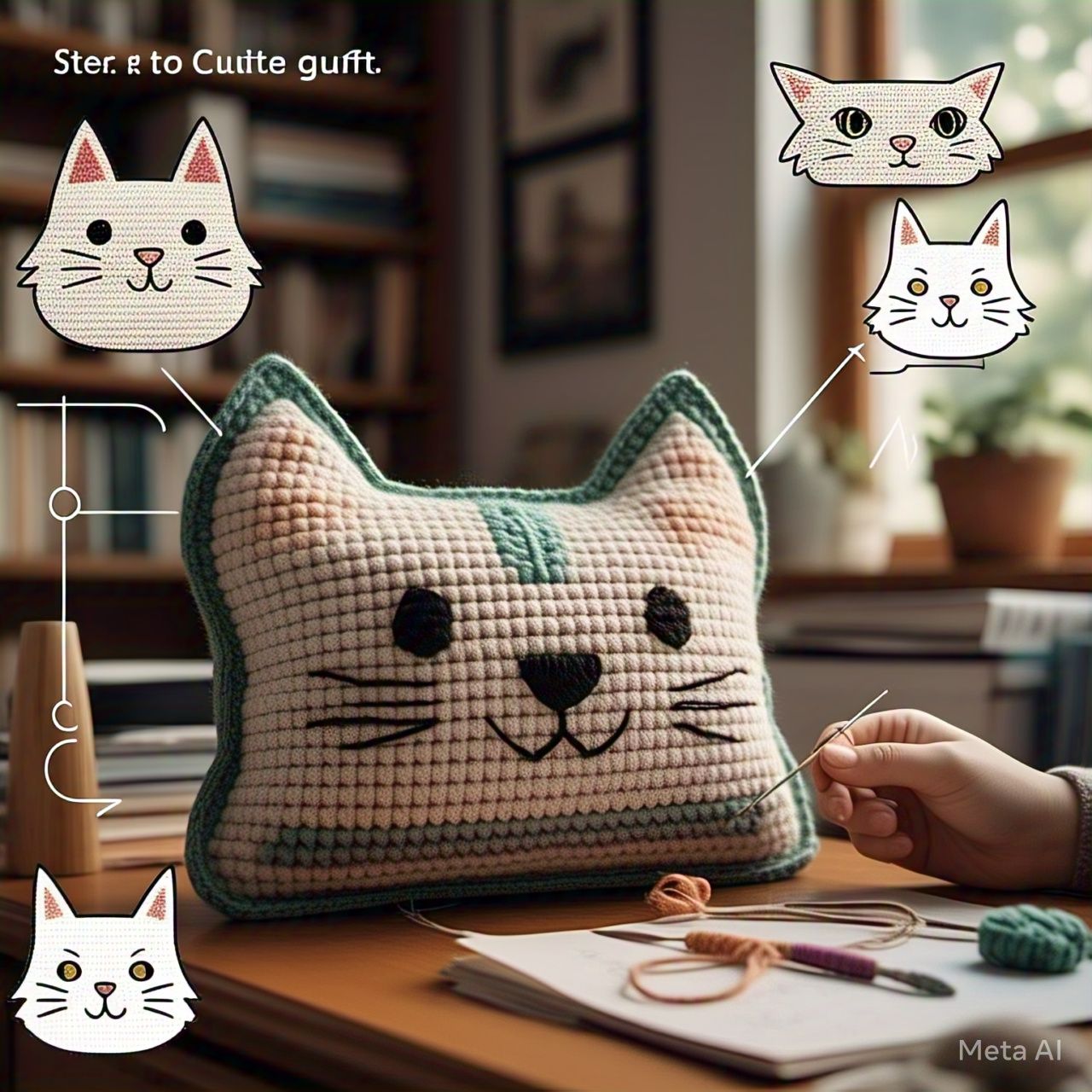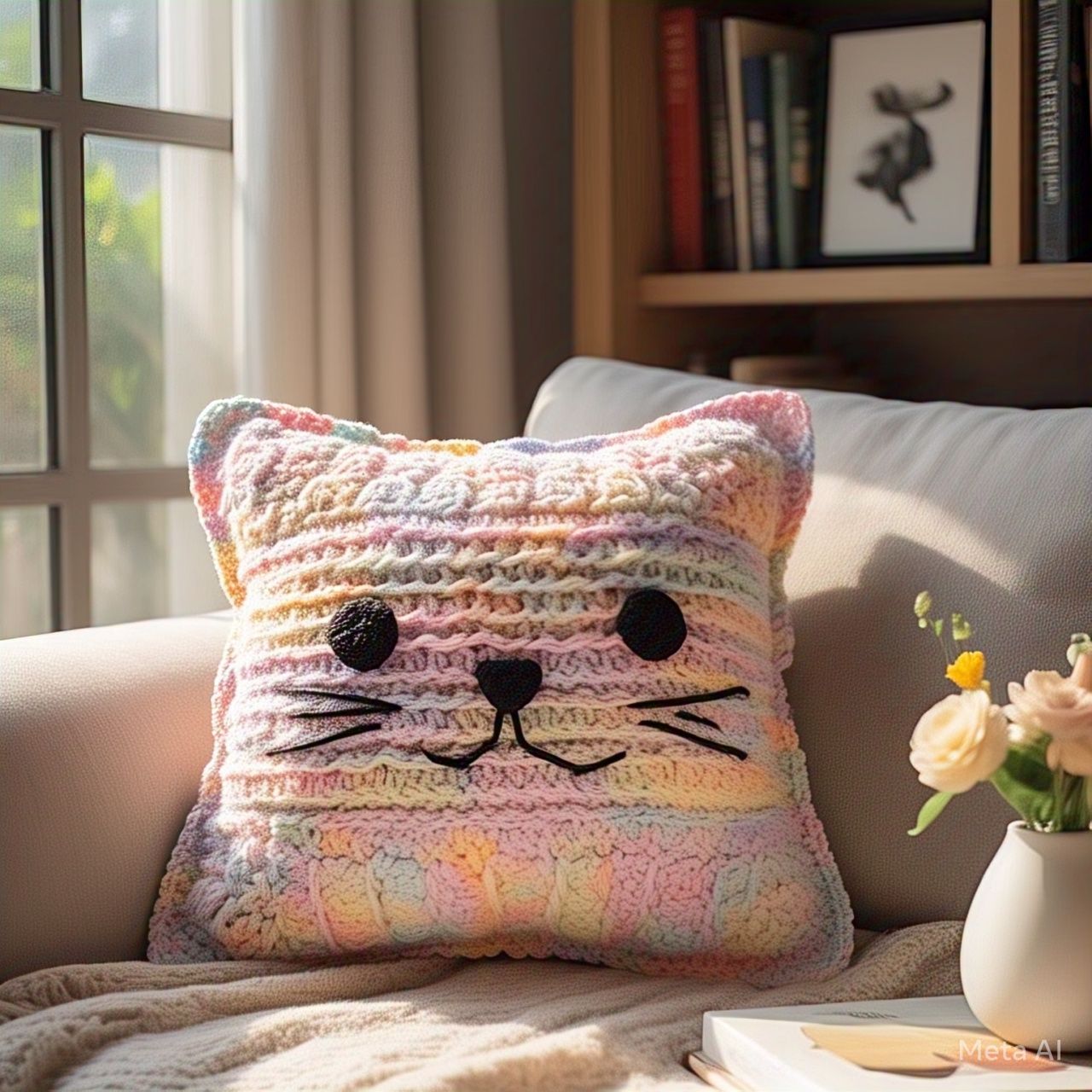The Benefits of Crocheting Cat Pillows for Stress Relief
Crocheting and Its Therapeutic Effects
Crocheting is a craft that involves creating fabric by interlocking loops of yarn with a hooked needle. While it is often seen as a hobby or a way to make handmade gifts, crocheting has gained recognition for its mental health benefits. One popular project among crafters is making crocheted cat pillows—soft, plush items shaped like cats that serve as both decorative pieces and comforting companions.
The Rise of Crocheting as a Stress-Relief Activity
In recent years, more people have turned to crocheting as a way to manage stress and anxiety. The repetitive motions of stitching can have a calming effect on the mind, similar to meditation. Studies have shown that engaging in crafts like crocheting can lower cortisol levels, the hormone associated with stress. The focus required to follow a pattern and create something tangible helps distract from negative thoughts, providing a mental escape.
Why Cat Pillows? The Emotional Connection
Cat pillows, in particular, hold a special appeal. Cats are often associated with comfort and relaxation—many people find their presence soothing. For those who may not own a pet, a crocheted cat pillow can serve as a symbolic representation of that comfort. The act of crafting the pillow itself enhances emotional well-being, as the maker invests time and care into creating something soft and huggable.
How Crocheting Engages the Mind and Body
Crocheting is not just a mental exercise; it also engages fine motor skills. The rhythmic movements of the hands can help reduce physical tension, especially in individuals who experience stress-related muscle stiffness. Additionally, the sense of accomplishment from completing a project boosts self-esteem and provides a positive emotional reward.
What to Expect in This Series
This article will explore the various ways crocheting cat pillows can aid in stress relief. The following sections will delve into the science behind crafting and relaxation, the step-by-step process of making a cat pillow, personal stories of individuals who have benefited from this hobby, and tips for incorporating crochet into a daily wellness routine.
The Science Behind Crocheting and Stress Reduction
Understanding why crocheting helps with stress requires looking at both psychological and physiological factors. The combination of creative expression, repetitive motion, and tangible results makes crocheting an effective tool for relaxation.
The Psychological Benefits of Crafting
Engaging in creative activities like crocheting activates the brain’s reward system. When a person works on a project, the brain releases dopamine, a neurotransmitter linked to pleasure and motivation. This natural mood booster can help combat feelings of anxiety and depression.
Furthermore, crocheting requires concentration, which can act as a form of mindfulness. By focusing on each stitch, the mind is less likely to wander into stressful thoughts. This meditative quality is one reason why many people describe crocheting as a way to “zone out” in a positive way.
The Role of Repetition in Calming the Mind
The repetitive nature of crocheting—pulling loops of yarn through other loops in a consistent pattern—creates a soothing rhythm. This repetition can induce a state similar to that achieved through deep breathing exercises or guided meditation. For individuals with racing thoughts, this rhythmic activity provides a mental anchor, helping to slow down an overactive mind.
Physical Relaxation Through Hand Movements
Stress often manifests physically, leading to tense muscles and restlessness. Crocheting involves gentle, controlled hand movements that can help release tension. The tactile sensation of yarn running through the fingers also adds a sensory element that many find comforting.
The Impact of Completing a Project
Finishing a crocheted cat pillow provides a sense of achievement. This accomplishment can be especially meaningful for individuals dealing with stress, as it reinforces their ability to create and control something positive. The finished product serves as a physical reminder of their effort and skill, which can be reassuring during difficult times.
Scientific Studies Supporting Craft-Based Therapy
Research has shown that engaging in arts and crafts can improve mental health. A study published in the Journal of Neuropsychiatry and Clinical Neurosciences found that activities like knitting and crocheting reduce the risk of cognitive decline while also alleviating symptoms of anxiety. Another study in the British Journal of Occupational Therapy reported that 81% of participants felt happier after knitting or crocheting.
These findings highlight the therapeutic potential of crocheting, making it more than just a pastime—it’s a valuable tool for emotional well-being.
How to Crochet a Cat Pillow – A Step-by-Step Guide
For those interested in trying crochet as a stress-relief activity, making a cat pillow is an excellent beginner-friendly project. The process itself is relaxing, and the end result is a comforting item that can be used or gifted.
Materials Needed for a Crocheted Cat Pillow
Before starting, gather the necessary supplies. These include medium-weight yarn in preferred colors, a crochet hook (size appropriate for the yarn), stuffing material, a yarn needle, and scissors. Optional additions include safety eyes or embroidery thread for facial details.
Basic Crochet Stitches to Know
While patterns may vary, most cat pillows use fundamental stitches such as the chain stitch, single crochet, and double crochet. Practicing these stitches beforehand can help build confidence before starting the actual project.
Following a Simple Cat Pillow Pattern
A basic cat pillow pattern involves crocheting two identical cat-shaped pieces and sewing them together. The steps typically include:
- Creating a magic ring and working in rounds to form the head.
- Increasing and decreasing stitches to shape the ears and body.
- Crocheting separate pieces for limbs or tail if desired.
- Stuffing the pillow before closing the final stitches.
The Meditative Process of Crocheting the Pillow
As the crafter works through each row, the repetitive motions become almost automatic, allowing the mind to relax. The focus on counting stitches and following the pattern keeps distracting thoughts at bay. Many people find this stage deeply calming, as it combines creativity with structured activity.
Adding Personal Touches for Emotional Connection
Customizing the cat pillow with unique colors, patterns, or facial expressions enhances the emotional connection to the project. Some crafters choose to make their pillow resemble a real pet, while others enjoy experimenting with whimsical designs.
The Joy of Finishing and Using the Pillow
Once completed, the cat pillow can serve multiple purposes—it can be a decorative item, a comforting hug pillow, or even a gift for a loved one. The pride of creating something by hand adds to the stress-relief benefits, reinforcing a sense of purpose and satisfaction.
Personal Stories and Tips for Incorporating Crochet into Daily Life
Hearing from individuals who have experienced the stress-relieving benefits of crocheting cat pillows can be inspiring. Additionally, learning how to make crochet a regular part of a wellness routine ensures long-term benefits.
Real-Life Experiences: How Crocheting Helped People Cope
Many crafters share stories of how crocheting helped them through difficult times. Some describe it as a way to unwind after a long day, while others credit it with helping them manage chronic anxiety. The act of creating something soft and comforting often mirrors the emotional comfort they seek.
Making Crochet a Habit for Stress Management
To fully benefit from crocheting, consistency is key. Setting aside even 15-30 minutes a day to work on a project can create a calming routine. Some people crochet in the morning to start their day mindfully, while others use it as a way to wind down before bed.
Combining Crochet with Other Relaxation Techniques
For enhanced stress relief, crocheting can be paired with other calming activities. Listening to soft music, audiobooks, or nature sounds while stitching can deepen relaxation. Some crafters also practice deep breathing exercises as they crochet to further reduce tension.
Joining a Community for Support and Inspiration
Online crochet groups, local crafting clubs, and social media communities provide encouragement and inspiration. Sharing progress, asking for advice, and seeing others’ creations can motivate continued practice and foster a sense of belonging.
Final Thoughts on Crocheting for Stress Relief
Crocheting cat pillows offers more than just a creative outlet—it’s a powerful tool for managing stress. The combination of mindful stitching, the joy of creation, and the comfort of the finished product makes it an ideal activity for those seeking relaxation. Whether as a hobby or a therapeutic practice, crocheting can bring peace and satisfaction to everyday life.
By exploring this craft, individuals may discover a fulfilling way to reduce stress while creating something beautiful and meaningful. The simple act of looping yarn into stitches can weave together not just a pillow, but also a greater sense of calm and happiness.









